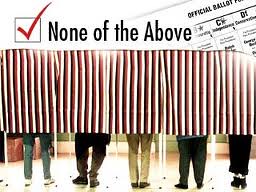Fight against Corruption: Recall, Reject or Prevent Black Money
Anna broke his silence when it appeared that the movement was in danger of imploding. His renewed call about launching new offensive if Congress failed to pass the Jan Lokpal Bill in the winter session, was probably an effort to get the movement back on track. At the same time he turned his guns to the electoral reforms – Right to Recall and Right to Reject.
Right to Recall - draws its legitimacy from the fact that voters should have a right to exercise control if their representative fails to perform. Such a right is not new and does exist in some democracies. Few years ago voters in California recalled their Governor Gray Davis. Two days ago voters in Arizona recalled a representative who authored a controversial bill on immigration. The current thinking by Election Commission of India is that this is not feasible as it will destabilize political system besides being too expensive! The second point has some merit as holding elections in India is quite expensive. Remember in US there are always some ballot measures and elections every year in November. This makes testing of any electoral measure not expensive. The other argument about destabilizing electorate system is at best tenuous. Safeguards can be built (like minimum number of signatories) to ensure that frivolous or spiteful actions are avoided. I have seen examples where MPs once chosen, return rarely to their constituency or renegade on election promises with impunity. With the sword of accountability hanging over the head, the winner will be more active and constituent will not have to wait for the next election to select a different candidate.
Some turmoil is preferable to higher level of accountability.
None of the Above:
This is an interesting proposition. It does exist in some shape and form in several countries including Spain, Greece, Russia and UK. Election Commission earlier mooted a proposition in 2003, known as “49-O.” Under this, the ballot papers and voting machines will have an option for voters to register “None of the Above” or NOTA. However, EC took the thunder away by clarifying that the votes under NOTA will not prevent a winner even if NOTA polls more votes than those of the winning candidate!

In short - yes you can have a right to register your protest but we are not going to listen!!
Not sure why Anna’s team agrees with this proposition.
Money Control
The one area that certainly needs reforms is election expenditure. While current laws prescribe maintaining a register of election expenses and its audit by a Chartered Accountant, the provision is severely inadequate. Singapore has prescribed a limit of $3.50 per elector to avoid distortion of democratic process!
As Returning Officer and Election Observer, I have seen how easy it is to get around to the limits set by the EC ( Rs. 40,00,000 = $ 800,000) for a Member of Parliament. A quick review of some election expenses, filed by candidates in the last election in 2009 in Mumbai, shows that candidates had filed expenditure that was less than the limit set for the Assembly Elections (Rs. 16,00,000 = $ 350,000).
This is almost ludicrous. The average size of population of MP’s constituency is 2M while an MLA is elected by less than 340,000. My experience has been that the real expenses is at least 8x -10x of the amount disclosed! This attracts black money in campaigns and becomes a source of many malpractices.
Clearly a candidate after winning has not only to recoup the amount spent but , also collect enough for the next elections.
While the idea of state funding of election expenses is being toyed with over the years, consider the following. Last general Elections in 2009 cost Rs. 112M to the exchequer. The maximum election expenses allowed to the candidates would not have cost more than 15% of this. Thus state funded campaign expenditure would not be an unbearable burden on the people, but would be a great help in stemming the flow of black money into elections.
This will be a small price to pay for limiting or eliminating use of black money in elections.
|
|
